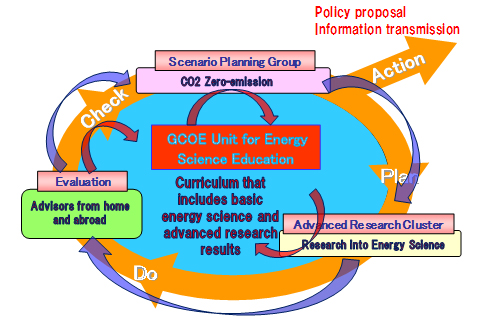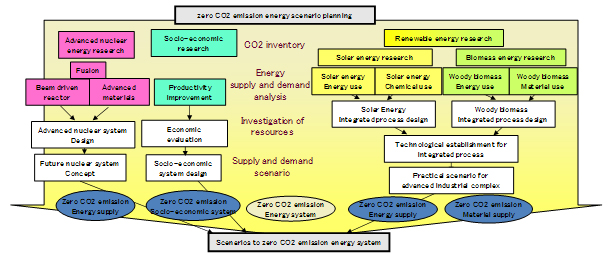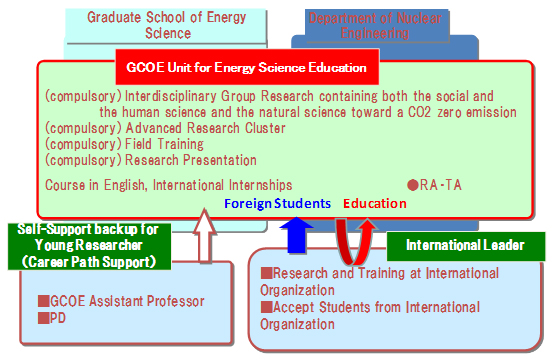- Motivation - Program Overview
Greenhouse gas emission (hereinafter called CO2 emission) is regarded as the main factor in global warming as stated in the IPCC report in 2007. A shortage of fossil fuels by the end of this century is also predicted. Consequently, showing possible paths to achieving a worldwide zero CO2 emission system independent of fossil fuels is not only a pressing issue for the world but also a research topic that should be initiatively pursued by Japan, as a developed country but poor in terms of energy resources. In energy issues, not only the natural science, but also the social science that seeks new social systems and human science that considers social way is also deeply related. It is necessary to establish the “Low carbon energy science” in the interdisciplinary field adding the social science and the human science to the natural science.
This program aims to establish an international education and research platform to foster educators, researchers, and policy makers who can develop technologies and propose policies for establishing a scenario toward a CO2 zero-emission society no longer dependent on fossil fuels, by the year2100. The students will acquire the faculty to survey the whole “energy system” through participation in scenario planning and interaction with researchers from other fields, and apply it to their own research. This approach is expected to become a major feature of human resources cultivation.
In the course of implementing the Global COE, we placed the GCOE Unit for Energy Science Education at the center as is shown in Fig.1-1, and we proceed from the Scenario Planning Group, the Advanced Research Cluster to the Evaluation, forming mutual associations as we progress. The Scenario Planning Group sets out a CO2 zero emission technology roadmap and establishes a CO2 zero emission scenario. They will also conduct analysis from the society values and human behavior aspect. This task is provided as an education platform, and is made useful for human resources development. The Advanced Research Cluster, as an education platform based on research, promotes the studies by following the road map established by the Scenario Planning Group. As Energy Science Research for no CO2 emission, from the point of view that the main cock should be turned off first, we targeted at primary energy as Renewable Energy (Solar Energy and Biomass Energy), Advanced Nuclear Energy (Fission and Fusion), and Socio-economic Study of Energy because the energy issues cannot be simply considered as a technological problem, but it is deeply related to the social and economic elements.

Fig.1-1. Full picture of the Global COE.
Fig.1-2 shows the outline of the research tasks proceeding with time, making the Scenario Planning Research and the Advanced Research correlate each other. With the Scenario Planning Research, shown in the center, we carry on the socio-economic study, study of solar energy and biomass energy, and research for advanced nuclear energy. Evaluation is conducted by exchanging ideas among advisors inside and outside of the university and from abroad, through the establishment of an advisory committee consisted of external experts, implementation of external evaluation by external evaluating committee, implementation of self-inspection and evaluation and so on, to manage the platform by gathering feedback on the scenario, education, and research.

Fig.1-2. Outline of the Research Tasks.
For education, which is the central activity of the Global COE, we establish “the GCOE Unit for Energy Science Education” and select students from the doctoral course, and we foster core human resources by making the students of the Unit participate in the Scenario Planning Group and the Advanced Research Cluster and receive a practical education.
The fundamental principle of the GCOE Unit for Energy Science Education is to foster a human resource:
- Who has comprehensive ability to have a profound knowledge regarding the energy and environmental issues, to understand both the social and human scientist and the natural scientist, and to carry out collaborative work,
and - Who has independence to organize a research group for the intended research, and to perform the research cooperating with other researchers,
and - Who has internationality to have an international perspective, a communication ability, and a world-class standard research ability,
and - Who has potential to contribute in solving the energy and environmental issues which relate deeply to the sustainable development of human beings.
The "CO2 zero emission education program" provided by this unit is shown in Fig.1-3. It has made the following compulsory subjects:
- "Open recruitment group research" to plan and conduct interdisciplinary group research containing both the social and the human science and the natural science toward CO2 zero emission at the initiative of the students themselves.
- "Advanced research" to participate in the Advanced Research Cluster as an independent researcher and to master creativity and independence.
- "Field training" to visit field site such as nuclear power plant or waste power plant or etc. and to make practical learning.
- "Research presentation" to make research presentation at an international congress or an industry-academia cooperate symposium or an international workshop.
Furthermore, the following subjects are also provided: - International education through classes in English, invitation of researchers and strategist from abroad.
- Long-term overseas education and acceptance of foreign students.
And also, students in this unit are recruited as research assistants to provide adequate economic support. Annual wage system program-specific educators and researchers are recruited by international open recruitment, then are joined the scenario planning or advanced research as independent researchers, and are fostered as practical researchers. They also instruct the students' research, are cultivated their instructing skills, and are fostered as researchers who inherit the human resources cultivation to the next generation.
Furthermore, in order to transmit the achievement of this platform to public, we will promote,
- Information transmission through website,
- Publication of quarterly newsletters in English and Japanese,
- Hosting domestic and international symposiums and activity report meetings,
- Co-hosting related meetings domestic and international such as SEE (Sustainable Energy and Environment) forum and so on,
- Hosting of an industry-government-academia collaboration symposium and citizen lectures.
Based on the above-said activities, we foster every year academic researchers who will inherit the human resources cultivation, industrial researchers who will put the research achievements into practice, policy makers, and strategist who will support an international organization as becoming government representatives of the future COP.
And the followings are expected as the social value and the pervasive effect,
- Contribution toward realizing CO2 zero-emission, and policy proposal coordinated with government and autonomy, domestic or abroad, and international agencies,
- Spread of Energy Science as an interdisciplinary academic field and provide of new approach for the education and the research,
- Establishment of information channel, human exchange path and education system to solve the energy issues,
- Contribution to utilization of nuclear power with improved social acceptance,
- Contribution to prevention of global warming and energy security
- Spread of the effective achievements to the south-east Asian Nations through international cooperation such as the SEE forum, activities at platform universities and so on.

Fig.1-3. CO2 zero-emission education program.


